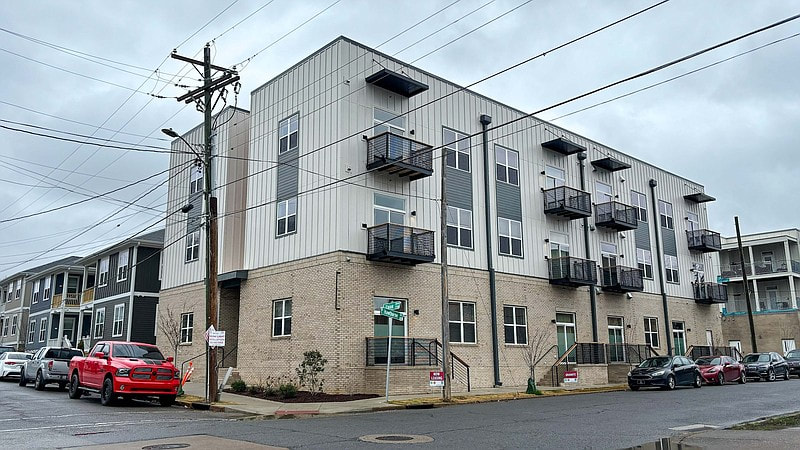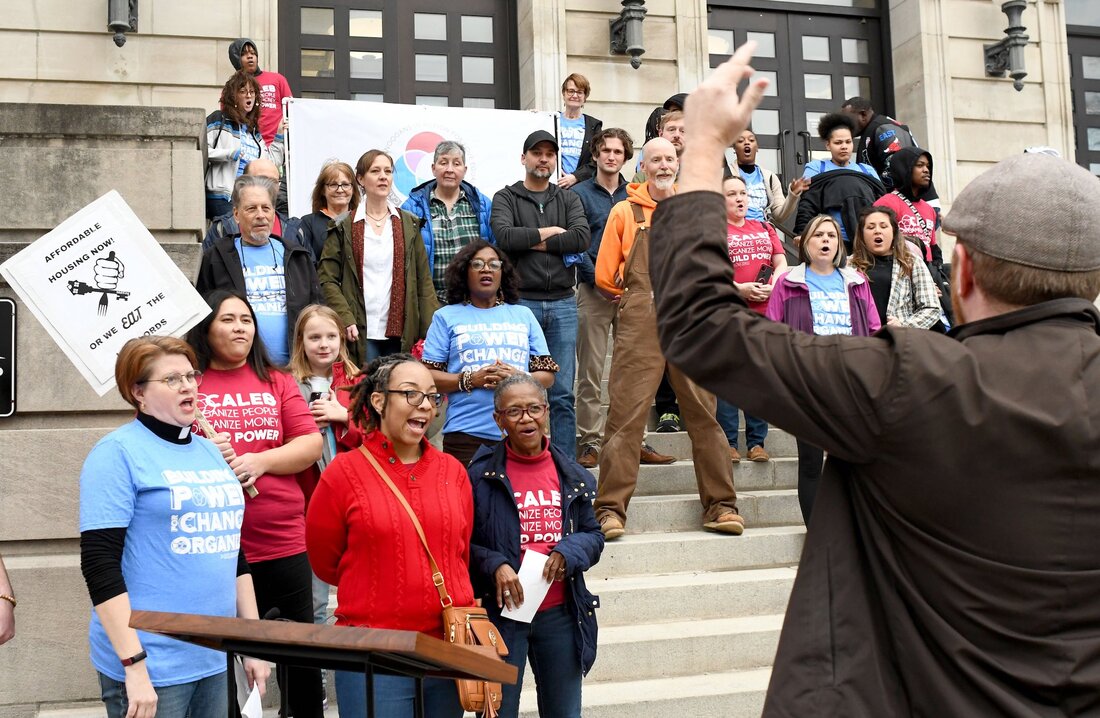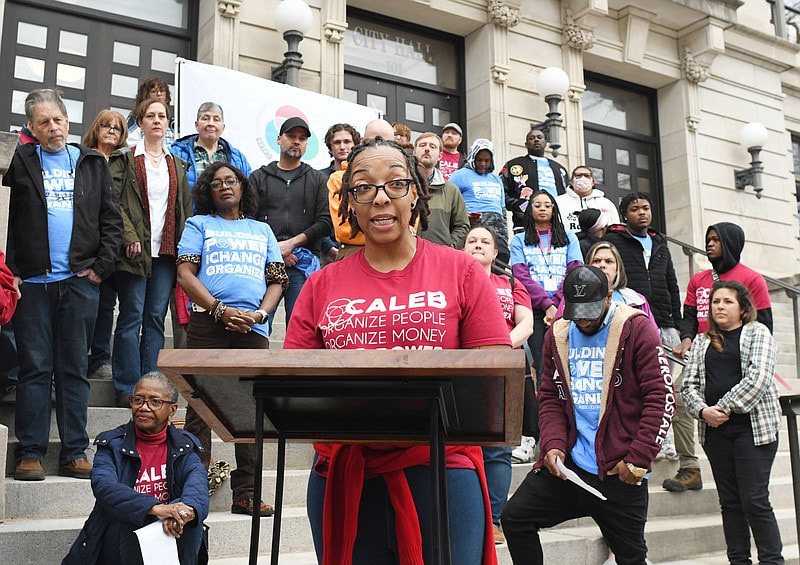|
Staff photo by Olivia Ross / Key Bonding Co. is seen on Thursday. When a Hamilton County magistrate judge told Allen Shropshire his bond was $89,000 for a series of alleged nonviolent offenses, he said he was in shock.
Although Shropshire has never been convicted of a felony, he has lost upwards of about $50,000 bonding out of the Hamilton County Jail during his lifetime, he said. "I can't afford to go get a house for me and my kids because of money I've lost to the system," Shropshire, 37, said. "The bond system has taken so much from me." This month, the nonprofit legal organization Civil Rights Corps and nonprofit Chattanoogans in Action for Love, Equality and Benevolence sent a memo to Hamilton County officials in an attempt to combat situations such as these; it outlines allegedly unconstitutional bond requirements for those awaiting trial. It doesn't appear that the county's bond system is always consistent when considering the accused crime. ___ DOCUMENT ___ Shropshire was allegedly stopped for driving left of the center line and arrested on charges including possession of a firearm and various drugs when he was given that $89,000 bond. On the other hand, Luis Abraham, who is accused of rape and incest, has a $75,000 bond, according to the Hamilton County Criminal Court docket this month. Audrey Johnson, who is accused of attempted first-degree murder, has a $5,000 bond. Asked whether county officials were discussing the concerns raised about bond practices, Hamilton County District Attorney Coty Wamp did not respond. Read more...
0 Comments
Staff photo by Matt Hamilton/ Supporters gather Sunday for a photo during a rally for the upcoming Volkswagen Chattanooga union vote. The rally was sponsored by Chattanoogans in Action for Love, Equality and Benevolence and was held at the at IBEW Local 175 Hall. Union supporters rallied Sunday ahead of what they called a potentially historic election at Volkswagen Chattanooga this week to organize a foreign automaker in the South.
To do so, the United Auto Workers will need to overcome the union's own recent history of corruption, with one group saying the UAW spent millions of dollars last year on travel, country clubs and entertainment. But Sunday afternoon, more than 200 people packed a union meeting room at the International Brotherhood of Electrical Workers' office in Chattanooga in a raucous rally. Volkswagen workers and their families, community members, clergy and others joined the effort to see an outcome in which the automaker's employees vote to select the UAW as their bargaining representative. VW assembly worker Billy Quigg told the group that employees are proud to work at the plant and know the company is "a good influence" on Chattanooga. Still, he said Volkswagen is making billions of dollars and "all of us in this room know why we should vote yes." "We can make sure issues are heard and resolved," Quigg said. Over 200 rally for organizing Volkswagen ahead of potentially historic election this week He said other auto plants are unionized in the South, such as the General Motors factory in Spring Hill, Tennessee, which he termed "a shining beacon." Michael Gilliland, organizing director of Chattanoogans in Action for Love, Equality and Benevolence, said at the rally there's a lot of momentum and more energy than in past elections, when the UAW was voted down at VW. Gilliland, whose group helped put on the rally, said in an interview the new contracts the UAW won after strikes against the Detroit Three automakers is one reason... Read more... The South Broad Community Benefits Coalition is a group comprised of The South Chattanooga Community Association, The Community Association of Historic Saint Elmo, The Mary Walker Towers Residents' Council, The Bethlehem Center, The Chattanooga Building Trades, The International Association of Bridge, Structural, Architectural and Reinforcing Ironworkers Local 704, The International Brotherhood of Electrical Workers Local 175, The Chattanooga Area Labor Council, green|spaces, Service Employees International Union Local 205, and Chattanooga in Action for Love, Equity and Benevolence.
For over a year, our Coalition has been negotiating a Community Benefits Agreement with the Chattanooga Lookouts and the developer and property owners for the new Lookouts Stadium to address how construction of the stadium and surrounding development will benefit the South Broad community in Chattanooga. A Community Benefits Agreement (CBA) is a legally binding agreement generally between a developer and local community groups that serves to ensure residents impacted by large infrastructure projects and other types of development share in the benefits of such developments in their community. CBAs have been used across the country, including in Nashville, Atlanta, San Diego, and Las Vegas, among other communities, to secure benefits including commitments to hire directly from the community, contributions to economic trust funds, local workforce guarantees, environmental initiatives, affordable housing, and more. After more than a year of negotiations, we have been unable to obtain an agreement with the developer, property owners, and Lookouts on issues of critical importance to the Coalition. These issues include local and diverse workforce and apprenticeship guarantees, affordable and equitable housing, funding and benefits for local schools, diverse business enterprise requirements, and various community services. In a final analysis of the CBA, the scale of the enforceable benefits offered by the developer was not commensurate with the scale of the disruption this development will bring to the South Broad community. While we were given verbal commitments from the developer on several of our requests, the Coalition is not willing for the CBA to be simply unenforceable promises. Accordingly, we have decided to end the negotiations for what would have been Chattanooga’s first CBA. In the last couple months, we have also been working with the City of Chattanooga to obtain a Memorandum of Understanding to address specific issues and benefits surrounding construction of the Stadium by the Sports Authority. Unfortunately, due to budgetary restraints and state contracting restrictions, many of our requests, including commitments for expanded safety standards and worker training, have proven impossible. This process has been frustrating for the Coalition and we believe will be disappointing for the community at large. The negotiation process has involved an immense commitment of volunteer hours, but our negotiators have held to our commitment to obtain real material benefits for the South Broad community. We have never been interested in a CBA merely for its own sake. We are interested in the benefits themselves. If the goals we laid out in the winter of 2022 can be achieved by other means, we support the full exploration of those avenues. A CBA is an accountability mechanism, by which we hoped to give communities long accustomed to broken promises a robust legal recourse; however, its absence does not mean that these goals are unachievable or that the community should give up on accountability and transparency. Our advocacy is needed more than ever. At this point, only negotiation of the Development Agreement between local government and the developer remains to clear the way for this project to break ground. We are calling on the City and County to ensure that the Development Agreement includes significant provisions for workforce housing (a commitment of at least 30% of units to be permanently affordable at 60-100% area median income), sets environmental standards for construction similar to those recently established for new development in The Bend's tax increment financing (TIF) district, requires the involvement of disadvantaged business enterprises in construction activities, and requires the donation of two acres of land in an appropriate location within the development for the creation of a CARTA mobility center. Despite the end of the Community Benefits Agreement process, we will continue to advocate for the stadium development to provide meaningful benefits for the South Broad community. Leaders of a coalition of local organizations that has worked for the past year and a half to negotiate a community benefits agreement for the new Chattanooga Lookouts stadium said Thursday they are ending talks with officials.
A city official, however, said it's still happening. Geoff Meldhal, of the nonprofit Chattanoogans in Action for Love, Equality and Benevolence, said a committee formed to negotiate with the South Broad District landowners and the baseball team has decided to break off talks. He said in a phone call the group was not able to get "meaningful safeguards" for the community on contracting for the stadium construction and the larger development on the 120-acre former U.S. Pipe/Wheland Foundry site. The minor league team is proposing to move there from AT&T Field on Hawk Hill, its home field since 2000. Meldhal said the budget for the stadium has also been a factor. Earlier this year, officials revealed the cost of the project had increased from an initial estimate of $80 million to approximately $120 million, although the public exposure has since been reduced to $115 million. The coalition of community groups includes the South Chattanooga Community Association, Iron Workers Local 704, Chattanooga Building Trades and others. Read more... Hamilton County bond practices are allegedly violating the law and in need of change, advocates say3/27/2024 Staff Photo / A van is received by a guard at the Silverdale Detention Center, since renamed the Hamilton County Jail, in 2020 in Chattanooga. Hamilton County residents discussed bail reform Tuesday night. Many who are accused of crimes in Hamilton County are allegedly having their constitutional due process rights violated when bail is set — keeping more people in jail for longer stretches of time, advocates and a civil rights attorney said.
"The law as it's written is pretty great, but we all know that is not what is happening," Kiah Duggins, an attorney with Civil Rights Corps, said at a community meeting. "Even if you're found innocent, your whole life has been destabilized." Nonprofit Chattanoogans in Action for Love, Equality and Benevolence hosted Duggins and other advocates Tuesday night at the Camp House to discuss navigating bail reform in Hamilton County. Duggins has been speaking with General Sessions Judge Larry Ables, Chief Magistrate Lorrie Miller, the public defender's office and county Commissioner Warren Mackey, D-Lake Vista, about changing allegedly illegal bond practices, including not providing attorney representation when bail is set and long pretrial detention periods, she said. Recently, a federal court in the Eastern District of Tennessee ruled defendants are entitled to certain protections prior to trial. Since Hamilton County falls within that district, Duggins and other advocates said they hope stakeholders will fall in line with the ruling without the threat of a lawsuit. Those accused of crimes are entitled to assistance of attorneys, a finding on whether bail is unaffordable and a barrier to release, a finding on whether the bail amount is necessary to ensure the defendant's appearance, disclosure of the evidence, and the ability to confront and cross-examine witnesses, according to the federal ruling. Read more... Staff photo by Olivia Ross / Mai Bell II, an affordable housing complex in Highland Park, is seen on Friday, March 1, 2024. The lack of affordable housing has exploded into one of the most challenging problems facing America's cities.
Mayors across the country are being pressured to address the lack of affordability in the housing and rental markets. For a number of reasons, that task is easier said than done. According to home and apartment search engine Zillow, Tennessee rental prices in February averaged at $1,733 a month and inched up to $1,740 in March. That monthly cost is too burdensome for many families; remember that the average household income in Tennessee is a little more than $60,000, according to Census data. According to city data, Chattanooga is expected to have a shortfall of 7,000 affordable units by 2030. And between 2016 and 2021, one out of every four rental homes became unaffordable to households earning $35,000, according to data from the group Chattanoogans in Action for Love, Equality & Benevolence. Since 2021, the cost of rent has increased 30% — outpacing the 13% growth in household incomes. In 2022, Hamilton County saw the largest annual rent increase in the past decade, the Chattanooga Times Free Press previously reported. Chattanooga officials have heard the demand for more affordable housing, and after months of work, have developed several strategies to incentivize development of these housing units. Read more... Staff Photo by Robin Rudd / Activist Michael Gilliland, right, leads a cheer of "affordable housing now" as Chattanoogans In Action for Love, Equality & Benevolence held a news conference Feb. 22 on the Chattanooga City Hall steps. One of the tools Chattanooga officials use to encourage developers to build affordable housing may have broken down.
"Our current policy doesn't work especially well for anyone, neither the city, taxpayers nor private developers," Chattanooga City Council Vice Chair Jenny Hill, of North Chattanooga, said in a phone call. "It's a pretty inflexible program." As is, housing developers in Chattanooga can receive a tax break from the city if they ensure at least half the units in a project are affordable for people making at most 80% of the area median income, which city officials estimate is nearly $51,000. Additionally, the total value of construction must be $5 million. "It's really hard to make that work," Chief Housing Officer Nicole Heyman said in a phone call, which means few developers take advantage of it. The incentive reduces the property taxes developers must pay on a new project for a period of time in exchange for them meeting those specific conditions. Hoping to forgo the one-size-fits-all approach, the mayor's office is now proposing a new system under which tax breaks would be directly tied to the number of affordable units developers include in their projects. The Chattanooga City Council is set to vote on the changes in the coming weeks and heard a presentation of the plan Tuesday. Rather than requiring developers to meet strict prerequisites, the city would allow builders to receive a tax break based on the individual number of affordable units they want to include in a housing development. There would need to be at least 10 units in the building for it to qualify. The city would relieve at most $2 million in taxes per year across all projects. Additionally, property owners would be required to submit rents and income verification to the city annually, and Chattanooga would be able to conduct interior inspections of those units with violations resulting in a $5,000 fine per noncompliant apartment. Read more... Staff Photo by Robin Rudd / Nikki Lake, of CALEB, speaks during the event. Chattanoogans in Action for Love, Equality & Benevolence held a news conference Thursday on the Chattanooga City Hall steps to offer a public response to the city's housing action plan, which Mayor Tim Kelly released in August. The statistics paint a dire picture.
Between 2016 and 2021, one out of every four rental homes became unaffordable to households earning $35,000, according to data from the group Chattanoogans in Action for Love, Equality & Benevolence. Since 2021, the cost of rent has increased 30% — outpacing the 13% growth in household incomes. Now, community members are hoping city leaders can do something about it. Chanting "homes for all," members of CALEB stood on the steps of City Hall on Thursday evening to call on Chattanooga leaders to follow through with policy goals outlined in an affordable housing action plan released by Mayor Tim Kelly's office in August. "I live in Highland Park just a few miles from here, where a lot of my neighbors who have lived in that neighborhood for decades, especially people of color, are being priced out," April Berends, the rector of Grace Episcopal Church, said during the news conference. Specifically, they want the city to dedicate a consistent revenue stream for an affordable housing trust fund, form a local mortgage pool to expand access to homeownership and use public subsidies to increase citywide housing options. They're urging community members to speak in support of these measures at the upcoming City Council meeting at 3:30 p.m. Tuesday at 1000 Lindsay St. More information is available at calebcha.org/housing. Read more... Photo Gallery Chattanoogans call for city action on affordable housing crisis Negotiators ‘extremely close’ on Chattanooga’s first community benefits agreement, Lookouts say2/3/2024 Staff photo by Olivia Ross / Among those seeking a community benefits agreement from the Lookouts stadium deal is Chattanoogans in Action for Love, Equality and Benevolence, which hosted a nonpartisan celebration for National Voter Registration Day at East Lake Park in September. Those not old enough to register colored pictures with the theme of "Together we are strong.” Eyeing construction of a new sports arena built partially with public funds in 2016, the Milkwaukee Bucks entered into a legally binding contract with the community: By 2023, the minimum wage for janitors, ushers, food service workers and others would be $15 an hour, which would continue to increase annually at a rate tied to inflation.
Additionally, a significant percentage of hires would come from ZIP codes with high unemployment or underemployment, a term that describes people working involuntarily part-time or earn a wage below the cost of living. In 2018, when Major League Soccer expanded to Nashville, community groups insisted a new soccer stadium and the associated development come with a series of expectations. Stand Up Nashville negotiated a community benefits agreement with Nashville Soccer Holdings -- Tennessee's first -- that mandated 20% of all housing units to be reserved as affordable or workforce housing. It also required the company to pay stadium workers at least $15.50 an hour and to set aside square footage for child care, local artisans and small businesses. Now, as Chattanooga and Hamilton County officials hammer out a final deal to cover the cost increase for a new multiuse baseball stadium for the minor league Lookouts, an official with the team said he's hopeful the approximately 18-month negotiations on an associated community benefits agreement are nearing a resolution. "I think we're extremely close," Jason Freier, CEO of Lookouts owner Hardball Capital, said in an interview. The members of the South Broad Community Benefits Coalition:— South Chattanooga Community Association.
Geoffrey Meldahl, a member of the community group Chattanoogans in Action for Love, Equality and Benevolence, said negotiators have been forthright that they are not interested in this deal being window dressing. "This has to be a substantial agreement that makes a real material difference in the lives of Chattanoogans or nothing at all," Meldahl said in an email. Read more... CALEB members and supporters are showing up to push for clear legislation on tax incentives for private companies. From the Sunday edition of the Chattanooga Times Free Press:
Helen Burns Sharp, who founded the local group Accountability for Taxpayer Money after winning a lawsuit against the city for violating public meetings laws in a 2012 economic development deal, was included and thrilled when PILOT policies first appeared on the October 2022 IDB agenda, having advocated clear and open guidelines for more than a decade. The 2022 draft policy shared last fall included no mention of limiting the traditional legislative consideration over each PILOT, but the newest draft submitted to the IDB in June read differently. "I assumed we wanted to become more strategic in granting PILOTs, given that we are currently not collecting over $25 million in property taxes each year due to PILOTs," Sharp said in an email. "I now wonder if the primary result of these draft policies would be to make getting a PILOT easier and reduce the voice of the City Council and County Commission in the review process." Sharp said she believes all PILOTs should continue to be reviewed by the council and commission. "They are elected officials and thus accountable," she added. "They vote on budgets and PILOTs involve the budget in that they result in reduced revenues." Members of the economic mobility task force of Chattanoogans in Action for Love, Equality and Benevolence, a coalition of churches, labor unions, nonprofits and community leaders -- who have also been in conversations with city and chamber leaders over the past two years about developing PILOT policies -- say they are eager to discuss the most recent version and determined to remain engaged with the process. Development policies powerfully impact work opportunities and life circumstances, Joe Paden, a member of CALEB's economic mobility task force, said in an email. "We need a transparent process and meaningful standards for evaluating PILOT applications so the public and their representatives have a clear picture of whether or not a proposal will be a good investment to their short and long term economic circumstances in the form of job and training opportunities, good wages, community benefits and corporate accountability," he said. Read the full article at www.timesfreepress.com/news/2023/aug/05/proposed-policy-may-speed-tax-tfp/#/questions/. |
ABOUT
CALEB is an institutional coalition of faith-based, labor, and community groups working to build power to affect change in Chattanooga, TN. Archives
May 2024
Categories |








 RSS Feed
RSS Feed